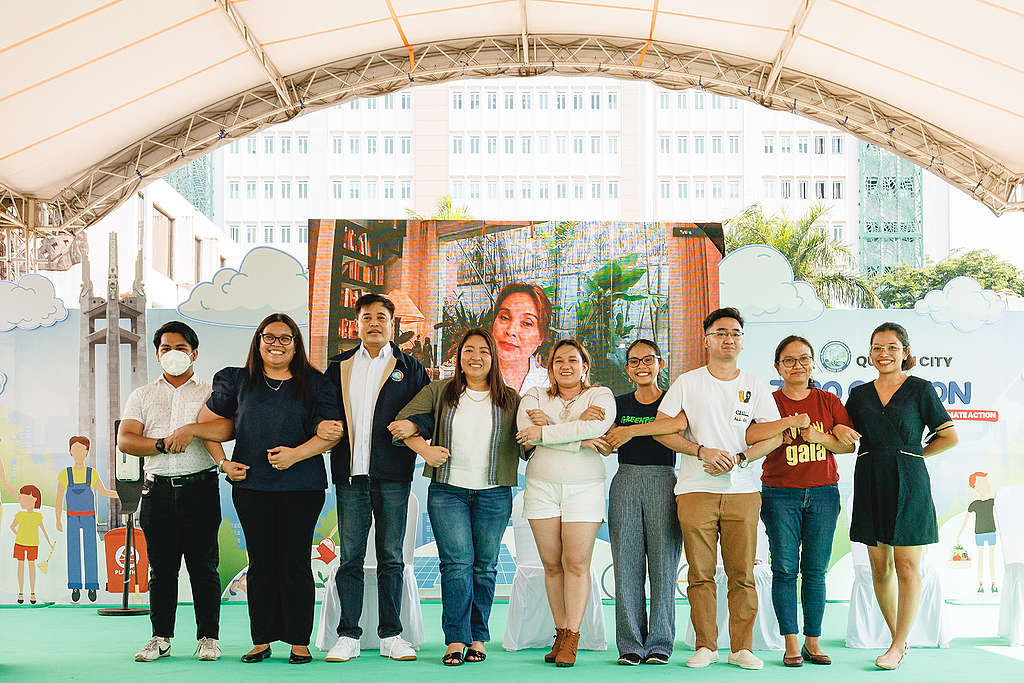
QUEZON CITY, Philippines (21 April 2023) — In celebration of Earth Day, youth leaders gathered at the Quezon City Hall for the “Plastic-Free Future Youth Forum” on Friday. Organized by Greenpeace Philippines, the Climate Change Commission (CCC), the Quezon City Local Government, and the Break Free From Plastic (BFFP) Movement, the event aims to shed light on the policies and solutions needed in order to achieve a safer and brighter future for the youth and the planet.
Industry’s present trajectory has plastic production tripling by 2050, derailing multiple sustainable development goals. Greenpeace believes that without a cap in production, an immediate planned phaseout of single-use plastics, and an urgent and just transition to zero-waste reuse models, the youth and the future generations will not be spared from the impacts of plastic pollution, the climate emergency, and exposure to toxic materials.
“This year’s Earth Day theme, ‘Invest in our Planet,’ couldn’t be more timely. It’s indeed time for countries, especially corporations, to invest in genuine zero-waste solutions that will safeguard people and give the youth a plastic-free future they deserve. Young people have the most to gain if we act on the plastics issue—and the most to lose if we don’t,” said Greenpeace Philippines campaigner Marian Ledesma. “We need a strong and ambitious Global Plastics Treaty that won’t just drastically reduce plastic production and turn off the plastic tap, but also drive industries and nations to invest in sustainable and socially equitable solutions to protect future generations from plastic pollution.”
Senate President Pro Tempore Loren Legarda graced the forum to deliver a keynote speech about the “Single-Use Plastics Regulation and Management Act of 2022.” She said, “The plastic crisis we face right now calls for a rethinking of our approaches to our governance and market systems and operations. While there is time, let us prevent our oceans from choking on plastics we humans only use once. The Earth will not heal on its own without any effort on our part. It is our primary responsibility to protect and preserve our environment.”
Plastic poses serious consequences to public health, social equity, climate, and the environment in every stage of its life cycle, from extraction of fossil fuels used for plastic production, to disposal in landfills or incineration. Recent studies reveal the ubiquity of microplastics, having been found in human lungs, the air, various food items, drinking water, and soil. Cases of sickness, mortality, and damage to livelihoods have also been attributed to the plastic pollution crisis.
“Our efforts should enable transformative changes in all our sectors, as well as in the behavior and mindset of households and individuals. This fight will not end in the foreseeable future, and that is why the youth have a critical role to play,” said Commissioner Rachel Anne Herrera of the Climate Change Commission. “We must focus on developing new, sustainable materials to replace plastic, as well as investing in new technologies and infrastructure that support a circular economy. Businesses must innovate and our government must further enable the environment that incentivizes sustainable production, use, and disposal of materials.”
A number of local plastic bans and community-led zero waste initiatives are being implemented in different parts of the Philippines in a bid to combat plastic pollution. In Quezon City, a local ordinance on banning plastic bags and single-use plastics was already in place since 2019, encouraging businesses like supermarkets, restaurants, and delivery services to explore sustainable alternatives.
“Masigasig tayong gumagawa ng mga hakbang upang mabawasan ang plastic waste ng lungsod. Mayroon tayong mga ordinansa na ipinapatupad simula pa noong 2019 na nagbabawal sa mga plastic bags, single use plastics at disposable materials. Prayoridad din nating pababain sa 50 percent ang basurang dinadala sa landfill. Pagpapatupad ng mga programa patungong circular economy ang pangunahin nating istratehiya dito,” said Quezon City Mayor Joy Belmonte. “Dahil sa mga polisiya at programa laban sa plastic pollution, hindi lang natin maiiwasan ang mga pagdami ng basura, nabigyan pa natin sila ng pagkakakitaan.”
As part of the “Life in Plastic,” a series of captivating artworks were launched during the event, visualizing the dreams and aspirations of the youth for a plastic-free future. The images—largely based on descriptions and messages written by various youth during the exhibit tour— were generated through artificial intelligence technology. The goal was to show the vision of young people hoping for a more liveable future, inspiring even more youth to amplify the call.
“These images capture the future that we dream of—a world where our environment is teeming with life, a world with a thriving biodiversity, a world free from plastics,” said BFFP Youth Ambassador Christian Derafera. “We must not let future generations inherit a degraded planet, but rather, nurture a home where it’s safe for them to live and dream. Investing in our planet is investing in the youth’s future.”
The event was supported by various sectors and organizations, including Quezon City’s Climate Change and Environmental Sustainability Department and Youth Development Office, Ecowaste Coalition, Miriam College Environmental Studies Institute, EARTH-UST, UP One Earth, UP Diliman University Student Council, and Ateneo FASH.
The “Life in Plastic” Exhibit was also mounted in the same event, providing guests a multi-sensory experience of the plastic crisis through interactive art pieces. The exhibit will be open to the public until April 24, 2023 at the Quezon City Hall.
###
AI images can be found here.
For more information, please contact:
Maverick Flores, Communication Campaigner
Greenpeace Philippines | [email protected] | +63 9176211552
Eunille Santos, Digital Campaigner
Greenpeace Philippines | [email protected] | +63 9175411248
